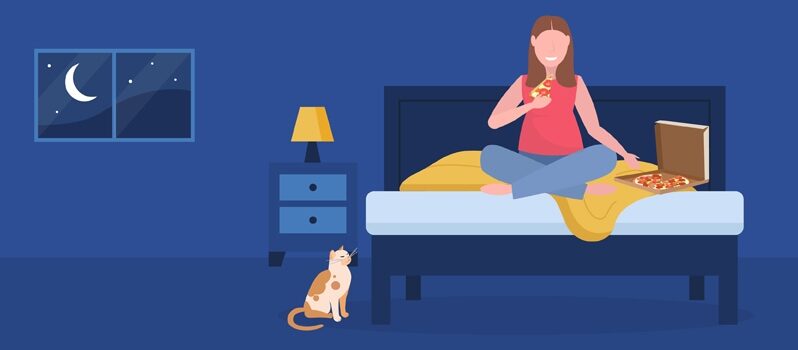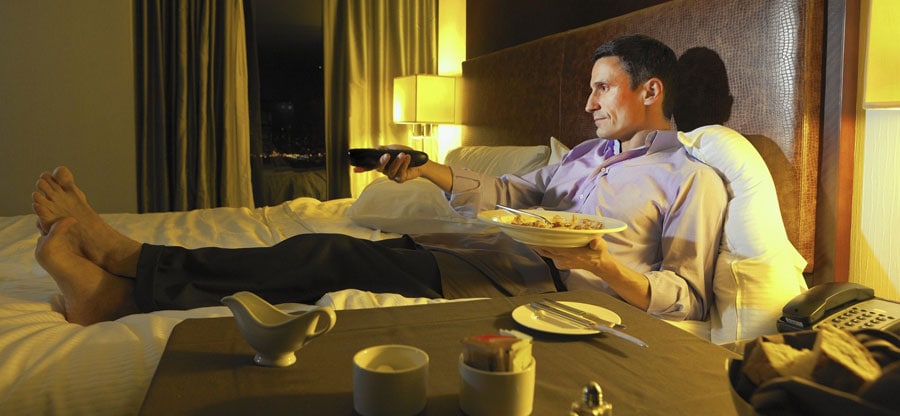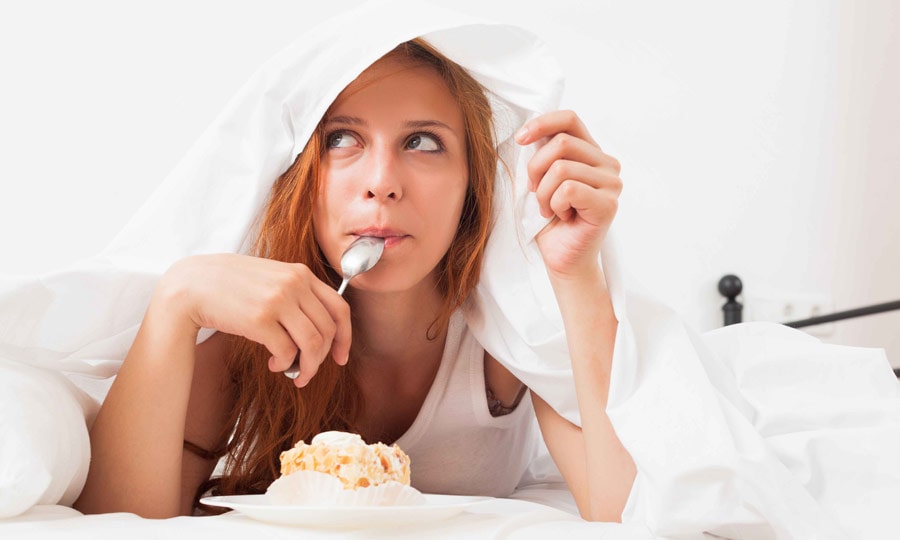Should You Eat Just Before Bed?

Should you eat just before bed or shouldn’t you? Many people believe that eating before bed tends to put weight on. Eating before sleep means that you will likely fall asleep with undigested food in your stomach. Your body works to digest it and in doing so can reduce the quality of your sleep if it doesn’t keep you awake. Not just that, but they also believe that, since you are not exercising to use up the energy that comes from your food, then the excess sugars are converted to fat. So you put on weight!
Is this true? It seems logical: if we don’t exercise to use the energy we eat, then that energy, in the form of sugars that our digestive system metabolizes from carbohydrates, will be stored as fat. Fat is the body’s way of storing energy for use when food is scarce. Many years ago, food was scarce in winter when fewer animals were around to hunt and most fruits and other vegetable matter were scarce. Our hunter-gatherer forebears used their fat as a winter source of energy when there were few foods to forage and few animals to hunt.
Modern thinking is that you should not necessarily put on weight by eating before sleep; at least not if you lead a reasonably active life. You will only put on weight if your total daily calorie intake exceeds your total daily calorie expenditure during the entire day. That means that if you are female, you need around 2,000 calories each day (i.e. 24-hour period) to maintain your existing weight. That is taking 2,000 calories as your average daily intake. This Calorie Chart will help you calculate your own calorie intake. This Activity Calorie Expenditure Chart will help you calculate your calorie expenditure. Click Here if you need a unit’s conversion chart (US – UK – Metric Conversions).

Take 1500 calories in your diet and you will lose weight – around a pound a week. Take 2500 calories and you will gain that weight. Exercise daily – for example, walk, run, cycle or swim, or spend some time in the gym, and you should be able to use up your excess calories.
It doesn’t matter if you consume these calories over two meals or four. It doesn’t matter if you eat sizeable portions just before sleeping! It is the total daily calorie intake that counts. For ‘calories’ read ‘energy’ when the calories are used by your body. Read ‘fat’ when your body does not use the calories for energy. That is the expert belief, and calories eaten in the daytime are just the same as those you eat at night. However, if you have already reached your calorie limit by bedtime, then eating more is sure to lead to weight gain. So weight wise, there is generally no reason why you should not eat before bed. So if it is not bad, is it good to eat before bed?
The answer is that you should avoid eating before bed, even though it may not result in weight gain. One reason for that is that your body is not able to rest properly after a late night meal. It is busy digesting your food and that can lead to heartburn or indigestion. It can also lead to mental exhaustion, and you may find yourself unable to get to sleep or having nightmares if you do. Exhaustion can lead to a lack of energy with consequent lack of exercise so your calorie usage will drop. This, in turn, will lead to weight gain as your metabolism converts excess calories to fat, nature’s emergency energy store.
Why should you eat before bed if you eat well during the day? Over-snacking late at night might make you feel less hungry in the morning. Skimping, or even skipping breakfast, can result in excessive snacking during the day. It can even lead to you eating before sleeping as a habit.
Let’s assume that you are currently in the habit of eating before sleep? What is the best type of food to eat at this time and how long should you wait after your snack to try and sleep? A light meal is best – drop the fries, cake and chocolate biscuits and go for something more easily digested such as fruit. Crackers are also good, but try to avoid stodgy high-calorie foods and protein-rich meats.
Food quality is important and fruit is easily digested so you should be able to sleep shortly after eating your snack. However, if you eat a large meal that takes a lot of digestion, or eats hot and spicy food, you may have to wait at least two hours or more. Each individual is different, and only you can genuinely answer the above question.
If you find it difficult to sleep after eating, then there are steps you can take to make it easier for you. Apart from eating less, or eating foods easy to digest, you should choose a comfortable mattress to sleep on.
A good question! Is it bad to eat before bed? There is no direct answer to that. A lot depends on what you eat and how much! It is certainly not good to eat a heavy three-course meal and then try to get some sleep! However, most people who eat late are snacking. High-calorie snacks can lead to weight gain. Sweets, chocolates, cookies and potato chips can all result in you putting on weight. If you are in the habit of snacking before you sleep then you should exercise more the following day or earlier that day so you burn the calories that you are going to eat – or have eaten.
It’s all in the balance between calories expended compared to calories consumed. The sensible answer is that ‘yes, it is bad to eat before sleep!’ If you eat a good diet and have three square meals a day, then eating before sleeping is unnecessary. Why should you have to eat later at night? If you must, then choose an orange, peach or some other soft fruit that is easy to eat and digest. Not a roast beef sandwich, a curry or a steak! In these cases, it is definitely bad to eat before bed.
In addition to heavy foods, what you should also avoid are alcohol and caffeinated drinks such as coffee, tea, and some energy drinks and caffeinated soft drinks. Focus on hot chocolate or a malt drink rather than fruit juices. The latter is OK to take although they may also contain sugar or artificial sweeteners aspartame or stevia.

The dieticians and other experts say that eating before bed is OK, so long as you don’t eat a heavy meal just before sleep. It is recommended that your last large meal should be 2-3 hours before you intend to sleep. Eating just before bedtime can harm your health, although a light snack of fruit is acceptable. It is very important that your daily calorie intake is not more than your calorie expenditure: the number of calories you use up in exercise and your daily routine. You can use the chart links provided earlier to establish your daily calorie intake and expenditure.
Donald Edwards is a sleep research expert with a deep knowledge of sleep and sleeping difficulties. He is a senior writer whose expertise and compassionate approach to establishing the fundamental causes of your sleeping issues enables us to help you to get the best night’s sleep possible and wake up fully refreshed for the day to come.
Medical Disclaimer: By using the insidebedroom.com website and/or purchasing any products or services through this website, you are voluntarily agreeing to this Disclaimer. You are agreeing that you have read, understand, and consent to the terms herein.
The information and other content found on this website, or in any linked references, are not intended to be expert medical advice and should not be construed as such. No information on this site, including written text, images, graphics and any other form of information, is intended to be a substitute for professional medical advice, treatment or diagnosis, but is intended for informational purposes only. If you need any form of medical advice or information, then refer to your physician or other medical expert.
Leave a Reply